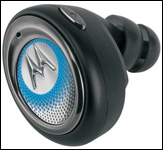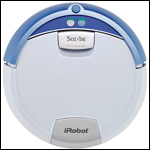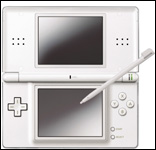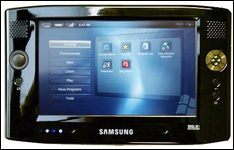The most exciting personal devices of 2006 are wireless, tiny, and occasionally even useful
We’re inching ever closer to the technological utopia so keenly envisioned on The Jetsons. Folks today conduct business with the push of a few buttons; life’s necessities are available on demand; and robots cater to our every whim. While we’re still waiting for the flying cars to arrive (What the hell, people?!), here are the gadgets you’ll be begging for this year.
 In your ear
In your ear
A man’s cell phone might be the only item in his life that he’d prefer to be as small as possible. Models like the Motorola SLVR are starting to look like something out of a science-fiction movie. Well, now there’s a Bluetooth headset to match. Set to be released in the first half of this year, the Motorola H5 Miniblue Bluetooth Headset fits entirely within your ear, just like Grandpa’s hearing aid. The company says it measures its dimensions in millimeters, and it’s not being disingenuous. The whole thing weighs a quarter of an ounce. For frequent talkers, this is the most unobtrusive and comfortable hands-free solution yet. For the rest of us, expect even more uncomfortable moments when we pass somebody on Boylston and think they’re talking to themselves like a crazy person.
 Roomba gets wet
Roomba gets wet
The Roomba, developed by Burlington-based iRobot, quickly became a cultural touchstone, and has even been parodied on Saturday Night Live (“It cleans my business. My lady business. And I like that”). The sentient little vacuum cleaner had one major drawback, however: it just couldn’t quite take care of those caked-on messes. The Roomba’s new counterpart, the Scooba, acts as a mop to the Roomba’s vacuum. Scooba constantly monitors its surroundings, readjusting its behavior dozens of times per second. All you need to do is fill it with cleaning solution — a Clorox-brand cleaner is the official liquid, but iRobot says you can also use a mixture of vinegar and water. At $399, the Scooba is a bit pricier than the Roomba, but imagine never having to deal with your nacho-cheese-encrusted kitchen floor again. What’s that worth?
 iPod Challenger
iPod Challenger
Competitors have been scrambling for years to match the iPod’s quality — not to mention grab a slice of that sweet, sweet market share — but it seems Creative Labs may have come closest with the Creative Zen Vision: M player. Not just a 30-GB MP3 player, the Zen Vision also provides higher-quality video than the iPod does, displaying more than 250,000 colors compared with the iPod’s 65,000. Plus, the Zen Vision is compatible with Microsoft Outlook’s calendar function, and it has voice recording. Judging by its rapturous reception at this year’s Consumer Electronics Show, it seems that the $300 portable might finally be the first serious challenger to iPod’s throne.
 Use your finger
Use your finger
Say you’ve been holding off on purchasing a Nintendo DS. Say you don’t yet realize the extent to which your life would be improved if you were logging some serious hours with Tetris, Metroid Prime Hunters, and Mario Kart. Well, wait just a little bit longer, because later this year, the Nintendo DS Lite will be released stateside. The DS Lite is, as its name implies, smaller and lighter than the original. The display is now much brighter, and the user can choose from among four levels of display intensity. The redesigned stylus is longer and thicker, although you can still use your finger. And after the Opera-branded DS Web browser is released (launching in Japan in June; no official US release date yet), you’ll be able to check your e-mail between wi-fi Tetris bouts. Take that, PSP.
 Hardcore techies need apply
Hardcore techies need apply
If you’re looking for a little more PC-style functionality, but without the cost or ability to do anything cool, you might look instead at an Ultra-Mobile PC. Called “UMPC” for short, these small tablet computers aim to split the difference between the functionality of a laptop computer and the versatility of a high-end cell phone. As with desktop PCs, several manufacturers have signed up to produce the hardware (Samsung is the first out of the gate), but the guts were developed jointly by Microsoft and Intel. Strangely, the UMPC will be released before it can take advantage of Microsoft’s upcoming operating system, Vista. Given the vast improvements in battery life, price, and functionality that will accompany UMPCs beyond 2006, it’s likely that only hardcore early adopters will line up for this one. But that’s exactly what happened with the Apple Newton, and remember how well that caught on? Don’t answer that.